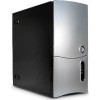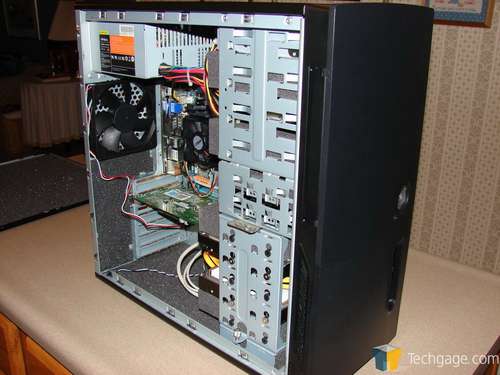- Qualcomm Launches Snapdragon 4 Gen 2 Mobile Platform
- AMD Launches Ryzen PRO 7000 Series Mobile & Desktop Platform
- Intel Launches Sleek Single-Slot Arc Pro A60 Workstation Graphics Card
- NVIDIA Announces Latest Ada Lovelace Additions: GeForce RTX 4060 Ti & RTX 4060
- Maxon Redshift With AMD Radeon GPU Rendering Support Now Available
AcoustiProducts AcoustiCase 340

If you’re not into silent PCs, then the AcoustiCase 340 probably isn’t for you. If that comment piques your interest, read on and find out why this case is a good choice for those who have the goal of reducing the noise output of their PC. We put it to the test, both thermally and sonically.
Page 5 – Thermal Performance and Noise
As was mentioned on the last page, the test system for this review previously resided in an Antec SLK3700, which is virtually identical to the AcoustiCase in design and internal volume. We weren’t too surprised – the SLK3700 is one of the most often-imitated cases we’ve seen. We suspect that the AcoustiCase 340 was made by the same OEM responsible for Thermaltake’s version of the chassis. All this similarity allows us a unique opportunity to examine the net effect on noise and case temperatures of adding the acoustic damping material.
- Test System
- CPU: AMD Athlon BE-2300 (1.9GHz 45W)
- Motherboard: Gigabyte GA-MA69GM-S2H (AMD 690G)
- RAM: 1GB (2x512MB) DDR2-800
- GPU: eVGA NVIDIA GeForce 7600GT KO 256MB
- Hard Drives: Seagate Barracuda 7200.8 80GB 7200RPM, Maxtor 100GB 7200RPM
- PSU: Antec SU-380
- Other Hardware: DVD-RW drive
To test the system’s thermal performance, we loaded the CPU in much the same way as we have in the past, by firing up a round of Futuremark’s 3DMark2006 with a temperature monitoring program set up to run in the background. This test loads both cores of the CPU during the CPU rendering test to nearly 100%, which gives us our peak temperature value for the CPU core.
The stock AMD CPU cooler was used, though the CPU Smart Fan control was disabled, as well as AMD Cool N’ Quiet – we wanted the CPU to run as hot as possible. The SLK3700 used a pair of Evercool Ever Green case fans (800 RPM nominal) in push-pull mode (one intake, one exhaust), and the AcoustiCase 340 was fitted with the supplied AcoustiFan. For a third test, we swapped in one of the Evercool Ever Green fans, to test the case’s performance with a consistent airflow level.



What these results show is not particularly surprising – the thermal performance of the AcoustiCase with its faster-spinning case fan outstrips the SLK3700 case. However, when we substituted one of the Evercool Ever Green fans that were used in the SLK3700 case (which spin much slower than the 1500RPM AcoustiFan), we saw things come back into line for the most part.
What we didn’t expect was that the nearly identical AcoustiCase still outperformed the SLK3700 by 3 degrees C at idle, and still held a 1 to 3 degree advantage over the Antec SLK3700 when under load by our stress test. We think it’s because of all the extra ventilation in the front of the AcoustiCase’s steel chassis. Since it provides less restriction than the front of SLK3700’s chassis, the slower-spinning Evercool Ever Green fan operates against a lower airflow impedance.
Now we’re getting to the heart of what the AcoustiCase is all about – noise reduction. The AcoustiPack damping material demonstrates its effectiveness here, by rendering the full-speed stock AMD CPU fan virtually inaudible, as well as the GPU cooler and any hard drive idle noise. The AcoustiPack foam turns the case interior into a sponge for noise – the same techniques are used in noise isolation enclosures for noisy industrial machinery such as air compressors and Roots blowers. Essentially, it’s a big muffler.
The muffler-like characteristics of the AcoustiCase didn’t help absorb any noise from the rear case fan, however, and the 1500RPM AcoustiFan supplied by QuietPC was still plainly audible in our “quiet room” at 24.7dB. When we swapped in our 120mm Evercool “Ever Green” reference ‘silent’ case fan (which only runs at 800 RPM and features a sleeve bearing variant for low noise), we were rewarded with an extremely quiet system using ordinary components – enabling the motherboard’s smart CPU fan control resulted in a completely silent system. If you have some way of slowing down the AcoustiFan to below 1000 RPM, such as a “rheobus” or other variable controller, we suspect the AcoustiFan would work as well as our reference Evercool fans for silence.
|
|
Support our efforts! With ad revenue at an all-time low for written websites, we're relying more than ever on reader support to help us continue putting so much effort into this type of content. You can support us by becoming a Patron, or by using our Amazon shopping affiliate links listed through our articles. Thanks for your support!





